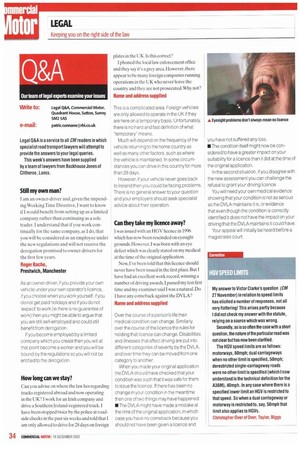Q&A
Page 34

If you've noticed an error in this article please click here to report it so we can fix it.
Our team of legal experts examine your issues
Write to: Legal Q&A, Commercial Motor,
Quadrant House, Sutton, Surrey SM2 5A5
e-mail: patriccunnaneca)rbi.co.uk
Legal (MA is a service to all CM readers in which specialist road transport lawyers will attempt to provide the answers to your legal queries.
This week's answers have been supplied by a team of lawyers from Backhouse Jones of Clitheroe, Lancs.
Still my own man?
I am an ow ner-dri% er and, given the impending Working Time Directive.! want to know if! would benefit from setting up as a limited company rather than continuing as a sole trader.! understand that if you work continually for the same company. as I do, that you will be considered as an employee under the new regulations and will not receive the derogation promised to owner-drivers for the first few years.
Roger Bache.
Prestwich, Manchester As an owner-driver, if you provide your own vehicle under your own operator's licence, if you choose when you work yourself, if you do not get paid holidays and if you do not 'expect' to work (ie there is no guarantee of work) then you might be able to argue that you are still self-employed and could still benefit from derogation.
If you become employed by a limited company which you create then you will at that point become a worker and you will be bound by the regulations so you will not be entitled to the derogation.
How long can we stay?
Can you advise on where the law lies regarding trucks registered abroad and now operating in the UK? I work for an Irish company and drive a Southern Ireland-registered truck. I have been stopped twice by the police at roadside checks in the past six weeks and told that I am only allowed to drive for 28 days on foreign plates in the UK. Is this correct?
I phoned the local law enforcement office and they say it's a grey area. However, there appear to be many foreign companies running operations in the UK who never leave the country and they are not prosecuted. Why not?
Name and address supplied This is a complicated area. Foreign vehicles are only allowed to operate in the UK if they are here on a temporary basis. Unfortunately, there is no hard and fast definition of what "temporary" means.
Much will depend on the frequency of the vehicle returning to the home country as well as many other factors, such as where i the vehicle is maintained. In some circumstances you can drive in this country for more than 28 days.
However, if your vehicle never goes back to Ireland then you could be facing problems. There is no general answer to your question and your employers should seek specialist advice about their operation.
Can they take my licence away?
I was issued with an NW/ licence in 1996 which has now been rescinded on eyesight grounds. However. I was born with an eye defect which was clearly stated on my medical at the time of the original application.
Now. I've been told that this licence should never have been issued in the first place. But I have had an excellent work record,winning a number of driving awards.I passed my test first Lime and my examiner said I was a natural. Do I have any comeback against the DVLA?
Name and address supplied Over the course of a person's life their medical condition can change. Similarly. over the course of the licence the rules for holding that licence can change. Disabilities and illnesses that affect driving are put into different categories of severity by the DVLA, and over time they can be moved from one category to another.
When you made your original application the DVLA should have checked that your condition was such that it was safe for them to issue the licence. If there has been no change in your condition in the meantime then one of two things may have happened: • The DVLA might have made a mistake at the time of the original application, in which case you have no comeback because you should not have been given a licence and you have not suffered any loss.
• The condition itself might now be considered to have a greater impact on your suitability for a licence than it did at the time of the original application.
In the second situation, if you disagree with the new assessment you can challenge the refusal to grant your driving licence.
You will need your own medical evidence showing that your condition is not as serious as the DVLA maintains it is, or evidence that even though the condition is correctly identified it does not have the impact on your driving that the DVLA maintains it could have.
Your appeal will initially be heard before a magistrates court.




































































































































































































